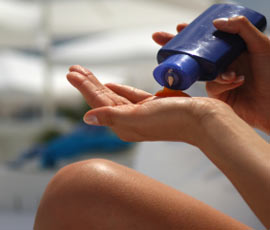Anti-ageing and aesthetic medicine is one of the fastest growing areas of medicine, fuelled by studies that show that good-looking people earn more. But it's not just about looks, also about the way you feel, and how well your body works.
What can you do to erase the stamp of time and highlight your beauty? Take a look at the questions most frequently asked of Health24's Anti-Ageing Expert and the Aesthetic Medicine expert. If these don't cover your concerns, write in for advice.
Q: at what age do I start my anti-ageing regime?
I am 28 and starting to see the signs of ageing, pigmentation, uneven skin tone and wrinkles around the eyes. At what age does one start an anti-ageing regime and at which products should I use?
A: This is definitely the time to start your ‘anti-ageing’ regime as you are starting to see the development of wrinkles and sun damage. Your first and most important step is to use a good SPF (50 or higher) applied several times daily that contains zinc oxide and/or titanium dioxide and to practice sun avoidance as much as possible. I would look at products such as NeoStrata, Environ, Nimue, etc. that contain ingredients such as alphahydroxy acids (glycolic acid), polyhydroxy acids (lactobionic acid), vitamin C, vitamin A derivatives, and other anti-oxidants.
You should have a cosmetic dermatologist or an aesthetic medical practitioner examine the skin and advise you on the best treatment approach. We also do a VISIA skin analysis on our patients as this not only determines the improvement of the treatment regime chosen but also highlights the damage that is to appear in 5 to 10 years; this allows us to start specific treatments to further reduce the ageing process.
Bags under the eyes
Q: I've heard that Preperation H has been able to help with bags under the eyes, would this be correct?
A: There have been a number of people who have reported good improvement of their under eye bags with Preparation H. the theory behind its effectiveness is the anti inflammatory effect of its ingredients.
Q: I am aged 35 years and have bags under my eyes which give me a tired appearance. I do think it is hereditary, and was wondering what treatments are offered for this condition and what is the approximate cost of surgery to have them removed.
A: Prices will vary from surgeon to surgeon but one can expect to pay between R 15,000.00 to R 25,000.00 for the surgery. If the fatty bags are aggravated by fat loss in the tear trough area (depression) then one may need to consider fillers to give the skin support and to help reduce the tired look. Your best option would be for a plastic surgeon or an aesthetic medical practitioner (with specific training in the eye area) to examine the eye bags and advise you on the best treatment options.
Q: acne scarring
I have an appointment at a laser clinic to see treatments for my facial scars caused by acne. Just want to confirm if lasers have proven to be effective in reducing the appearance of scars (these are now old scars - depressed and ice-pick) and what questions should I ask before proceeding. Can the lasers make the scars worse as only my cheeks are affected. The rest of my face is fine, prices etc.
Could you please shed some light on this?
A: Fractional ablative lasers have shown to be effective in treating acne scars however this is dependent on the age of the scar, depth of the scar, and type of scarring AND the operator using the technology. Looking at medical studies adequate clearance and smoothing of acne scarring can be achieved with Fraxel, Lumenis Ultrapulse FX, Sciton, Palomar Starlux, etc.
Another consideration is the relatively new technology Matrix RF which is a fractional bi-polar radiofrequency that has shown to achieve similar results to the lasers mentioned above but with less treatment discomfort (almost minimal), less downtime, and less side effects and complications. With either of the two options mentioned above (laser or Matrix RF) a number of sessions are required
(3 to 6) and should be performed every 4 to 6 weeks to achieve maximum benefit. The most important questions to ask before commencing treatment are as follows:
Is a doctor performing the treatment?
If so what are his or her training credentials?
How many patients with acne scarring has the doctor treated in the past?
What is the practice’s treatment clearance rate?
Ask for before and after photos
Acne scarring should not be made worse with these treatments, however, one runs the risk of laser-induced pigmentary changes and scarring if the settings are not chosen correctly.
Q: sunblock
Which sunblock do you recommend for people participating in sports outdoors? I have found that all the sunblocks that I' ve used (sport specific as well as waterproof) that were bought at a pharmacy tend to sweat off during participation, and one cannot stop to re apply.
A: As far as I am aware the only SPF that will not come off due to sweating is zinc (some surfers use it) but unfortunately it will make the skin look white. Your best option is to continue trying various sport specific SPF’s until you find one that works for you. If you have tried all of the products on the market my suggestion would be to consider Heliocare capsules that increase the skins natural SPF by a factor of 3. This will definitely help during your practice and sporting events.
Q: pigmentation
In 2006 I developed a dark patch on my right cheek. At first I thought it was sunburn and it would go away without any treatment, but it never went away. Last year, 2009 a similar dark patch developed on my left cheek, except that it' s still small. I saw a dermatologist last year who told me it could relate to genes from the family, and he gave me an ointment to apply on the mark at night as well as a sunscreen. The ointment was to make the dark patches lighter. He said it was just to maintain the skin, but would not make the darks marks to go away.
The ointment did make my skin lighter, but it also made my skin sensitive and painful in the affected area when I shave. I decided to give up and I need advice and second opinion. My mother also has these marks. These marks embarrass me - any advice?
A: From your description it seems that the marks on your cheeks are pigmentation. There are a number of options for the treatment of pigmentation such as sun avoidance, SPF applied several times daily, superficial chemical peels, topical depigmenting creams, and ablative fractional treatments that are safe to use in darker skin individuals (such as Syneron’s Matrix RF). If the topical product prescribed by the dermatologist was helping (most probably hydroquinone) then one may consider a lighter percentage to reduce the sensitivity.
Q: tattoo removal
Why is it advised when on roaccutane, to stop all laser hair removal? I still want to get my bikini line lasered. I' m halfway thru my laser sessions and will be going on roac soon. Secondly, can you tell me the scarring risks of having a tattoo excised. For religious reasons I want my tattoos completely removed by being cut out. I haven' t seen satisfactory results from laser removal - on black skin like mine. Apparently excision causes bad scarring is this true? Surely no worse than the c-section scar I have?
Is it necessary that the skin around the tattoo be very loose? I am still young (35) and am toned and firm, my skin is not loose at all. Would the skin be pulled too much if the procudure is performed on taut skin? I' d say my one tattoo is 2cm wide 4 cm long and the other 2cm wide 8cm long, and on my shoulder and lower back respectively.
A: I would definitely advise no ‘laser’ treatments while on Roaccutane and for the 6 months after stopping the tablets.
Generally speaking you should heal the same way as any other form of surgery (scar) when the tattoo is removed. Your best option would be to consult a plastic surgeon to can examine the tattoos (and the surrounding skin) and give you a more accurate indication of the extent of healing, scarring, and if the skin would look ‘pulled’. The scarring on the lower back and the shoulder should heal well, but my suggestion is to undergo Omnilux treatment sessions just before the surgery and during the healing phase as studies have shown superior wound healing with little to no scar formation.
Q: removal of fat in arms
I am 60 years old this year – I have fatty lumps in my upper arms. How do I get these lumps removed?
A: Your best option would be to consult a plastic surgeon to examine the areas of concern and suggest the best treatment options. Localized areas of fat can be addressed with injectable lipolysis (fat dissolving) injectables, laser lipolysis, and liposuction for very small, small, and larger areas of fat respectively.
More info:
Who is the Anti-Ageing Expert?
(Joanne Hart, Health24, October 2010)




 Publications
Publications
 Partners
Partners


















